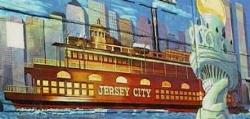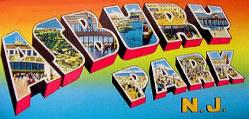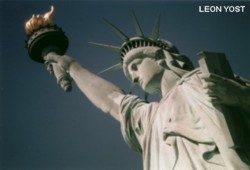 |  |  |
|
| ||
 |  |  |
 |  |  |
|
| ||
 |  |  |
|
|
Historic Houses
From Historic Houses of New Jersey by W. Jay Mills, 1902
The grand old mansion facing Military Park, recently acquired by the Essex Club from the estate of the Peters family, was erected in the early part of the last century, and was once the home of John Decatur, brother of the famous Commodore Stephen Decatur. There the hero of Tripoli, when on leaves of absence, several times came to enjoy old-time Newark hospitality and share in the delights of the chase.
The Gifford tavern, with its gaudy sign-board of hunters and hounds hanging over the northeast corner of the present Broad and Market Streets, was a great rendezvous for the sporting element of the town. There many Southerners, especially from Virginia, came up to spend a month or two, bringing their families, and Archy Gifford, the jolly landlord, was as well known in Westmoreland and Fairfax Counties as many a greater man of his generation. By the wide fireplace in the table-room, over mint juleps, mugs of brister beer, or bowls of hot toddy, many of the large meets were talked over and arranged, and it is safe to say that John Decatur always led in the discussions, as he was one of Newark’s greatest devotees of the sport. In the assembly-room the hunt balls were held. These affairs must have rivaled the famous assemblies of Philadelphia, which met in the Pantheon room of Gellers’s tavern. The latter were so strictly conducted that no stranger was admitted without a ticket signed by one of the managers, and no gentlemen allowed to enter in “boots, colored stockings, or undress.” A Pemberton Ramsey, of Elizabethtown, wrote to a friend in New York of his having attended one of the Newark assemblies a week before the death of “the Immortal Washington.” He found “a fine company present,” and one lady by the name of Runyon-who, shades of scandal! was said to be the daughter of a tailor-” wore a shocking low-cut but fashionable bodice.” There, also, in the afternoons, I. Mitchell, the town dancing-master, gave instruction in the terpsichorean art. Dancing was more difficult in those days of intricate fancy steps than at present. In an old early eighteenth century copy of Wood’s Newark Gazette and New Jersey Advertiser (which was the first paper printed in Newark with the exception of Hugh Game’s one issue of his Gazette, published on September 28, 1776, when he was in hiding from the British of New York) there appears this quaint advertisement:
Edited by GET NJ, COPYRIGHT 2002
Newark, with its miles of gently undulating farmlands along the Passaic, which trade and modern enterprise had not then desecrated, was an ideal fox-hunting country for long over half a century after the Revolution, and the sport was indulged in to a greater extent in this vicinity than anywhere else in New Jersey. Many of the prominent families kept their own coursers. Young ladies took delight in their hard-won trophies, and from the frequency those one-time favorites, “The Jockey Club, or a Sketch of the Manners of the Age,” and “The Female Jockey Club,” were advertised in early newspapers, they must have found their way into every pretentious library.
Archer Gifford is said to have been a near relative of the Gifford who was host of the College Inn at Princetown, which flourished in the beginning of the past century. That forgotten landlord was a noted wag in his day, and also a poetical dabbler. His advertisements in old papers are always in verse, and his quaint sign-board which used to hang outside of his tavern, and was in existence until a few years ago, bore the following amusing inscription:
Kind traveller, come rest your shins --
At this the peer of college inns.
I. MITCHELL.
One cannot help wishing that he could have obtained a peep at one of the classes in “serious and comic dancing,” for no doubt the ladies in their tight frocks, and the gentlemen in their equally tight breeches, looked as grotesque as the figures in the ludicrous prints called “Waltzing,” sold in great numbers at the time the “Salmagundi Papers” were mildly terrorizing North River society.
In the summer and fall-time large house-parties used to be held at the Decatur mansion, the guests coming from all over the country by stage-coach, or in great private vehicles. The drivers, footmen, and postilions in their gayly colored liveries must have been a sight well worth gazing on. A servant who ran away from his master in the nearby small city of Jersey, in 1820, and was advertised for in Newark, wore what would now be considered a comic opera attire of blue roundabout jacket, blue pantaloons, pink striped vest, yellow short trousers, and a pair of Wellington boots.
Although Commodore Decatur was more noted as a hero than as a huntsman, his brother John was reputed to be the finest mount in Sussex County, and many anecdotes were related in his day of his prowess in the hunting-field. One of these, regarding a run with a Mr. Williamson, I have taken from some anonymous reminiscences in an old daily paper, to show the keen interest in fox-hunting at that time:
We cannot help looking back at the gay meets at Newark in which the Cortlandts, Schuylers, Rutherfords, Jays, Porters, Kimballs, Kearneys, Roosevelts, Patersons, of the surrounding summer colonies, and so many of the residents and members of the French coteries of Elizabethtown took part, without something of a spirit of exhilaration if we dwell long on the picture. The crowd of ladies and gentlemen on mettlesome horses, starting from the pump by the Gifford tavern on a mild canter, and then dashing off at full gallop over High Street westward through field and woodland, past the old Ogden place, rising out of leafy elms and spiked poplars like some nobleman’s seat with its terraced grounds, on whose balustrades proud peacocks strutted.
Yoicks! yoicks! we hear them call, and then comes the echo of a horn, almost flute-like in the distance. The whipper-in cracks his whip, the dogs are in full cry, the horses are headed in another direction, and the whole of the scarlet-coated company gallops off into the sunlit distance.
There is a tradition that the wide hall of the Decatur House held the brushes of two hundred foxes; and it may be true, as the halls of all the great houses of Newark always contained the sporting trophies of the different members of the family. On the lawn were several cannon-balls given to his brother as presents by Commodore Stephen Decatur. They remained as garden embellishments
 Your Ancestors' Story |
 Bruce Springsteen's Jersey Shore Rock Haven! |

|
UrbanTimes.com |